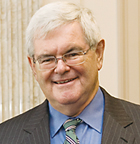
The biggest concern withpossibly enacting the Employee Free Choice Act is not the so-calledcard-check measure, which would make union organizing easier; it isthe lesser known binding arbitration clause, argues former U.S.Speaker of the House Newt Gingrich in an article Wednesday on politico.com.
He called the arbitrationprovisions of recently discussed proposals threats to the economy andpersonal freedoms. Labor and the businesscommunity have made the EFCA a top political battleground in recentmonths. Long-term care providers and most employers are against theEFCA.
Although support for the bill has apparently waned enough overthe past few weeks to keep it off the Senate voting schedule, thereis concern that a modified proposal could re-emerge.Bad idea, Gingrich argues,especially if it includes the current arbitration proposal, whichcalls for binding federal arbitration if workers and owners can’tcome to an agreement over wages and benefits within 120 days of asuccessful union organizing effort. Gingrich says union bosses couldsimply make outlandish demands during contract negotiations with thehopes that the National Labor Relations Board will exercise itsinfluence in favor of the unions.
Supporters of thelegislation say the arbitration clause is designed to preventemployers from dragging out contract negotiations after a union hasbeen formed. Under the bill, if after 30 days no contract has beenagreed upon, an arbitration board would put together a two-yearcontract that would be binding to both parties, “unless amendedduring such period by written consent of the parties.”




